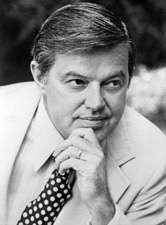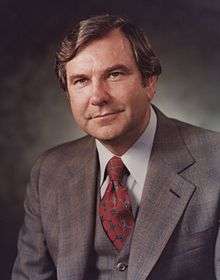Church Committee
.pdf.jpg)
The Church Committee was the United States Senate Select Committee to Study Governmental Operations with Respect to Intelligence Activities, a U.S. Senate committee chaired by Idaho Senator Frank Church (D-ID) in 1975. The committee investigated abuses by the Central Intelligence Agency (CIA), National Security Agency (NSA), Federal Bureau of Investigation (FBI), and the Internal Revenue Service (IRS). The committee was part of a series of investigations into intelligence abuses during the mid-1970s, including the Watergate Hearings, the Rockefeller Commission, and the Pike Committee. One result of the committee's efforts was the establishment of the permanent U.S. Senate Select Committee on Intelligence.
Background
By the early years of the 1970s, a series of troubling revelations started to appear in the press concerning intelligence activities. First came the revelations of Christopher Pyle in January 1970 of the U.S. Army's spying on the civilian population[1][2] and Sam Ervin's Senate investigations produced more revelations.[3] Then on December 22, 1974, The New York Times published a lengthy article by Seymour Hersh detailing operations engaged in by the CIA over the years that had been dubbed the "family jewels". Covert action programs involving assassination attempts against foreign leaders and covert attempts to subvert foreign governments were reported for the first time. In addition, the article discussed efforts by intelligence agencies to collect information on the political activities of US citizens.[4]
Overview

In 1975 and 1976, the Church Committee published fourteen reports on various U.S. intelligence agencies' formation, operations, and the alleged abuses of law and of power that they had committed, with recommendations for reform, some of which were later put in place.
Among the matters investigated were attempts to assassinate foreign leaders, including Patrice Lumumba of the Democratic Republic of the Congo, Rafael Trujillo of the Dominican Republic, the Diem brothers of Vietnam, Gen. René Schneider of Chile and Director of Central Intelligence Allen Welsh Dulles's plan (approved by President Dwight D. Eisenhower) to use the Sicilian Mafia to kill Fidel Castro of Cuba.
Under recommendations and pressure by this committee, President Gerald Ford issued Executive Order 11905 (ultimately replaced in 1981 by President Reagan's Executive Order 12333) to ban U.S. sanctioned assassinations of foreign leaders.
Together, the Church Committee's reports have been said to constitute the most extensive review of intelligence activities ever made available to the public. Much of the contents were classified, but over 50,000 pages were declassified under the President John F. Kennedy Assassination Records Collection Act of 1992.
Committee members
| Majority (Democratic) | Minority (Republican) |
|---|---|
|
|
- Members of the Church Committee
 Frank Church
Frank Church John Tower
John Tower.jpg) Philip Hart
Philip Hart Howard Baker
Howard Baker Walter Mondale
Walter Mondale Barry Goldwater
Barry Goldwater Walter Huddleston
Walter Huddleston Charles Mathias
Charles Mathias
Opening mail
The Church Committee learned that, beginning in the 1950s, the CIA and Federal Bureau of Investigation had intercepted, opened and photographed more than 215,000 pieces of mail by the time the program (called "HTLINGUAL") was shut down in 1973. This program was all done under the "mail covers" program. (A mail cover is when the government records—without any requirement for a warrant or for notification—all information on the outside of an envelope or package, including the name of the sender and the recipient.) The Church report found that the CIA was zealous about keeping the United States Postal Service from learning that government agents were opening mail. CIA agents moved mail to a private room to open the mail or in some cases opened envelopes at night after stuffing them in briefcases or in coat pockets to deceive postal officials.[5]
The Ford administration and the Church Committee
On May 9, 1975, the Church Committee decided to call acting CIA director William Colby. That same day Ford's top advisers (Henry Kissinger, Donald Rumsfeld, Philip W. Buchen, and John Marsh) drafted a recommendation that Colby be authorized to brief only rather than testify, and that he would be told to discuss only the general subject, with details of specific covert actions to be avoided except for realistic hypotheticals. But the Church Committee had full authority to call a hearing and require Colby's testimony. Ford and his top advisers met with Colby to prepare him for the hearing.[6] Colby testified, "These last two months have placed American intelligence in danger. The almost hysterical excitement surrounding any news story mentioning CIA or referring even to a perfectly legitimate activity of CIA has raised a question whether secret intelligence operations can be conducted by the United States."[7]
The Ford administration, particularly Rumsfeld, was concerned about the effort by members of the Church Committee in the Senate and the Pike Committee in the House to curtail the power of U.S. intelligence agencies. Frontline quoted U.S. diplomat and Nixon assistant Robert Ellsworth, who stated: "They were very specific about their effort to destroy American intelligence [capabilities]. It was Senator Church who said our intelligence agencies were 'rogue elephants.' They were supposedly out there assassinating people and playing dirty tricks and so forth... Well, that just wasn't true." Rumsfeld and Ellsworth prevented the committees from dismantling the CIA and other intelligence organizations.[8]
Results of the investigation
On August 17, 1975 Senator Frank Church appeared on NBC's Meet the Press, and discussed the NSA, without mentioning it by name:
| “ | In the need to develop a capacity to know what potential enemies are doing, the United States government has perfected a technological capability that enables us to monitor the messages that go through the air. (...) Now, that is necessary and important to the United States as we look abroad at enemies or potential enemies. We must know, at the same time, that capability at any time could be turned around on the American people, and no American would have any privacy left: such is the capability to monitor everything—telephone conversations, telegrams, it doesn't matter. There would be no place to hide.
If this government ever became a tyranny, if a dictator ever took charge in this country, the technological capacity that the intelligence community has given the government could enable it to impose total tyranny, and there would be no way to fight back because the most careful effort to combine together in resistance to the government, no matter how privately it was done, is within the reach of the government to know. Such is the capability of this technology. (...) I don't want to see this country ever go across the bridge. I know the capacity that is there to make tyranny total in America, and we must see to it that this agency and all agencies that possess this technology operate within the law and under proper supervision so that we never cross over that abyss. That is the abyss from which there is no return.[9][10] |
” |
Aftermath
R. Emmett Tyrrell, Jr., editor of American Spectator, wrote that the committee "betrayed CIA agents and operations." The committee had not received names, so had none to release, as confirmed by later CIA director George H. W. Bush. However Senator Jim McClure used the allegation in the 1980 election, when Church was defeated.[11]
The Committee's work has more recently been criticized after the September 11 attacks, for leading to legislation reducing the ability of the CIA to gather human intelligence.[12][11][13][14] In response to such criticism, the chief counsel of the committee, Frederick A.O. Schwarz Jr., retorted with a book co-authored by Aziz Z. Huq, denouncing the Bush administration's use of 9/11 to make "monarchist claims" that are "unprecedented on this side of the North Atlantic".[15]
In September 2006, the University of Kentucky hosted a forum called "Who's Watching the Spies? Intelligence Activities and the Rights of Americans," bringing together two Democratic committee members, former Vice President of the United States Walter Mondale and former U.S. Senator Walter "Dee" Huddleston of Kentucky, and Schwarz to discuss the committee's work, its historical impact, and how it pertains to today's society.[16]
See also
.pdf.jpg)
- COINTELPRO
- FBI–King suicide letter
- Hope Commission (established to investigate Australia's intelligence agencies)
- Hughes–Ryan Act
- Human rights violations by the CIA
- Operation Gladio (included in the classified part of the report)
- Operation Mockingbird
- Pike Committee
- Project SHAMROCK
- Rockefeller Commission
- The Shadow Factory
- Surveillance abuse
- Unethical human experimentation in the United States
References
- ↑ ABC News
- ↑ Charlotte-Mecklenburg Historic Landmarks Commission Archived August 29, 2005, at the Wayback Machine.
- ↑ Military surveillance. Hearings .., Ninety-third Congress, second session, on S. 2318., April 9 and 10, 1974 : United States. Congress. Senate. Committee on the Judiciary. Sub...
- ↑ Hersh, Seymour (1974-12-22). "Huge C.I.A. operation reported in U.S. against antiwar forces, other dissidents in Nixon years" (PDF). New York Times. p. 1.
- ↑ Benjamin, Mark (January 5, 2007). "The government is reading your mail". Salon.com.
- ↑ Prados, John (2006). Lost Crusader: The Secret Wars of CIA Director William Colby. Oxford University Press. ISBN 978-0-19-512847-5. p. 313
- ↑ Carl Colby (director) (September 2011). The Man Nobody Knew: In Search of My Father, CIA Spymaster William Colby (Motion picture). New York City: Act 4 Entertainment. Retrieved 15 September 2011.
- ↑ "Frontline". www.pbs.org. Retrieved 2006-07-30.
- ↑ "The Intelligence Gathering Debate". NBC. August 18, 1975. Retrieved May 28, 2015.
- ↑ Bamford, James (13 September 2011). "Post-September 11, NSA 'enemies' include us". Politico. Retrieved 21 September 2013.
- 1 2 Mooney, Chris (November 5, 2001). "The American Prospect". Back to Church. Archived from the original on 2006-12-05.
- ↑ Knott, Stephen F (November 4, 2001). "Congressional Oversight and the Crippling of the CIA". History News Network.
- ↑ Burbach, Roger (October 2003). "State Terrorism and September 11, 1973 & 2001". ZMag. 16 (10). Archived from the original on 2008-02-01.
- ↑ "Debate: Bush's handling of terror clues". CNN. May 19, 2002. Archived from the original on April 29, 2011.
- ↑ Schwarz, Frederick A. O.; Huq, Aziz Z. (2007). Unchecked and Unbalanced: Presidential Power in a Time of Terror. New York: New Press. ISBN 978-1-59558-117-4.
- ↑ "UK Hosts Historical Reunion of Members of Church Committee". University of Kentucky News. September 14, 2006.
Further reading
- Johnson, Loch K. (1988). A Season Of Inquiry, Congress And Intelligence. Chicago: Dorsey Press. ISBN 978-0-256-06320-2.
- Smist, Jr., Frank J. (1990). Congress Oversees the United States Intelligence Community, 1947–1989. Knoxville: University of Tennessee Press. ISBN 978-0-87049-651-6.
External links
| Wikimedia Commons has media related to Church Committee. |
- Church Committee reports (Assassination Archives and Research Center)
- Church Report: Covert Action in Chile 1963-1973 (U.S. Dept. of State)
- Interviews with William Colby and Richard Helms from cia.gov
- Recollections from the Church Committee's Investigation of NSA from cia.gov
- Church Committee Reports (Mary Ferrell Foundation)
- Book 1: Final report of the Select Committee to Study Governmental Operations with Respect to Intelligence Activities, United States Senate : together with additional, supplemental, and separate views. United States Government Printing Office. April 26, 1976. p. 391.
- Church Committee Report On Diem Coup
- Flashback: A Look Back at the Church Committee’s Investigation into CIA, FBI Misuse of Power
- The Church Committee: Idaho's Reaction to Its Senator's Involvement in the Investigation of the Intelligence Community